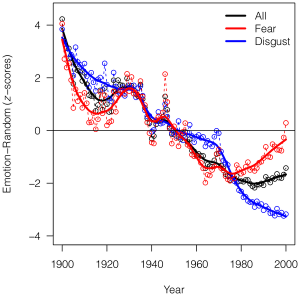A new paper is out (PLoS One so free to all), lead by Alberto Acerbi (Bristol Uni), and co-authored by Vasileios Lampos (Sheffield uni), myself (Durham Uni) and R. Alexander Bentley (Bristol Uni). Its a really fun paper looking at the changing pattern in the use of emotion words in the English language during the 20th Century. We make use of Google’s Ngram data. Google scanned approximately 4% of all books and generated a dataset of yearly world frequencies. We mined this dataset to extract the changing frequencies of emotion words throughout the 20th century.
In the data we can see the frequency of words expressing emotions such as anger, fear, joy, sadness, and disgust changing in line with historical events. Large social/cultural events like the World War II, the roaring 20s and the swinging 60s all show up as frequencies changes of words. Interestingly the World War I doesn’t seem to appear in the data, however the Great Depression in the 1930s does. We also expected, due largely to cultural stereo typing, that US books would be more emotional that UK. This is supported by the data, but the split occurs much more recently than we thought it might. Generally throughout the 20th century the frequency of emotion words has been declining, with one exception, fear. Could that be linked to the climate of fear that has developed during the latter half of the 20th century?

The paper has been really well received in the media, Alberto was interviewed for BBC Radio 4s Material World by Adam Rutherford. Alex and myself were interviewed for NPR.
Articles: